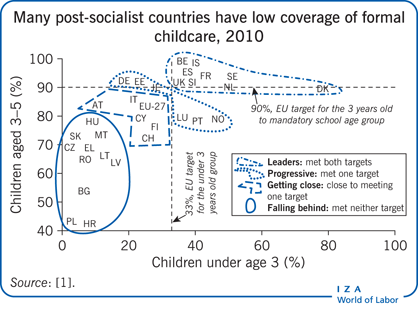Elevator pitch
In 2002, the EU set targets for expanding childcare coverage, but most of the post-socialist countries are behind schedule. While childcare expansion places a heavy financial burden on governments, low participation in the labor force by mothers, especially those with children under the age of three, implies a high potential impact. However, the effectiveness of childcare expansion may be limited by some common characteristics of these countries: family policies that do not support women’s labor market re-entry, few flexible work opportunities, and cultural norms about family and gender roles shaped by the institutional and economic legacy of socialism.
Key findings
Pros
Low maternal employment despite high overall female participation in the labor force calls for appropriate policies to increase maternal employment.
There is evidence that subsidized childcare for young children can increase maternal employment.
The effectiveness of childcare expansion can be augmented by changes in parental leave policy that do not require large additional resources.
Better work–family policies can support government goals of increasing fertility rates without sacrificing maternal labor force participation.
Cons
Expanding subsidized childcare would place a high financial burden on relatively poor post-socialist countries.
Family policies in these countries have generally moved away from encouraging the employment of mothers.
Cultural norms against the employment of mothers with very young children and a history of mistrust of institutional childcare facilities may hinder the effectiveness of policies.
The lack of flexible and part-time work opportunities may constrain the labor force participation of mothers with young children.
